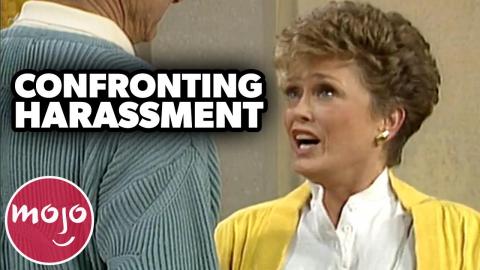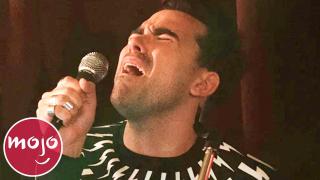Top 10 Times The Golden Girls Tackled Serious Issues

#10: Grief Various
Tragically, grief is an unavoidable part of life and something we’ll all experience. We could relate to Blanche after Big Daddy passed, and she felt a little lost without him. Additionally, she and Rose are both widowers. At one point, Blanche dreams her husband is still alive and is devastated when she wakes up and reality hits. Meanwhile, Rose shares the heartbreaking reason she moved to Miami. Dorothy and Sophia have also lost their fathers, but we also see them deal with the unimaginable pain of losing a brother and son, respectively. The show approaches the subject with the utmost sensitivity and is often very relatable.
#9: Blanche Comes to Terms with Her Brother’s Sexuality “Scared Straight”
“The Golden Girls” was a vocal champion of LGBTQ+ rights long before most. They addressed topics like coming out and acceptance with a loving sense of humor, but never made it the butt of the joke. For instance, in season two, they’re very welcoming of Dorothy’s friend Jean. However, Blanche is forced to reckon with her prejudices a couple of seasons later after her brother comes out. We see her go on a journey of shock, disbelief, and denial before finally coming to terms with it. She repeats this journey again when Clayton announces he’s having a commitment ceremony with his boyfriend. The show didn’t shy away from depicting important LGBTQ+ issues while advocating acceptance, love, and pride.
#8: Dorothy’s Star Pupil Faces Deportation “Dorothy's Prized Pupil”
Immigration often makes headlines today. But “The Golden Girls” addressing it in the late 80s was rather groundbreaking. Dorothy’s so proud of her pupil, Mario, that she innocently submits his essay to a district competition. Only this alerts the INS, and we learn that Mario is undocumented and faces deportation. Dorothy is wracked with guilt and works endlessly to support the teen. It was a thought-provoking episode, spotlighting that there are real people behind these cases who deserve to be treated with humanity. Sadly, the episode’s conclusion is all too familiar, especially today. It pulled at our heartstrings, as well as Dorothy’s, who promises to fight for him.
#7: Dorothy Calls Out Anti-Semitism “Dorothy's New Friend”
Dorothy’s delighted to befriend local novelist Barbara Thorndyke. The others, however, are less enthused once they get to know her. She’s stuck up, condescending, and just plain rude. Dorothy doesn’t notice any of this until Barbara invites everyone to an exclusive club - but says that Sophia’s date, who’s Jewish, isn’t welcome. She defends herself by saying that she doesn’t make the rules, but Dorothy’s retort makes it clear that she’s complicit just for accepting them. It’s a powerful reminder that saying nothing in the face of injustice is just as much a part of the problem. Dorothy tells her former friend and her bigotry where to go, and we couldn’t help but cheer her on.
#6: The Cost of Aging “Sophia's Choice”
Top 10 Times Gilmore Girls Tackled Serious Issues
Naturally, a show about four older women frequently addressed the tribulations that come with aging. Like when Rose faced age discrimination in the workforce. But in this case, we really feel Sophia’s heartache when she sees the conditions of the home where her friend Lillian lives. Sophia decides to take her in, but the foursome soon realizes they’re ill-equipped to give Lillian the care she needs. They return to the home where they learn a sad truth about the facility and likely many others like it. In another episode, Sophia’s friend Martha shows that the cost of aging isn’t always just financial. This heartbreaking reality hits home now more than ever and advocates for better Elder Care.
#5: Unhoused People “Brother, Can You Spare That Jacket?”
While we’re on the subject… the women spend the night in a shelter for the unhoused after chasing down a jacket containing a winning lottery ticket. Sophia’s shocked to run into a familiar face and even more so when she learns why she’s there. The other women also engage in humbling conversations that shatter our hearts into a million pieces. A season later, Dorothy discovers her ex-husband is unhoused, once again proving it can happen to anyone. And, with the rising cost of living, these stories feel even closer to home now. By putting a face to an ever growing and real crisis, these episodes invite audiences to challenge their own preconceptions of people with low income or who are unhoused.
#4: Rose Struggles with Substance Use Disorder “High Anxiety”
10 Times David Rose Was the Best Character on Schitt's Creek
This poignant episode coincided with the growing substance crisis across the U.S. in the 80s and 90s. The typically happy-go-lucky Rose shocks her friends when she suddenly becomes hostile and defensive. They later discover the root of her mood swings and suggest she seek professional help, but she’s afraid and would be humiliated. However, when her substance use disorder becomes too overwhelming, she finally agrees to get help. The following season, Dorothy relapses into old gambling habits, much to her loved ones’ concerns. Eventually, she also concedes that she needs additional support and starts attending meetings. Both episodes teach that such issues can affect anyone and that there’s no shame in asking for help.
#3: Blanche Confronts Her Harasser “Adult Education”
Women have been batting off unwanted advances long before the
#metoo movement gave them a platform to be heard. In this plotline which tackles the subject honestly and respectfully, Blanche’s teacher offers to pass her if she does something for him in return. She tries to report him to the Dean, but he’s unhelpful, and she ultimately leaves disheartened in a scene that, sadly, many will find all too familiar. So Blanche takes matters into her own hands and gives her teacher a talking to he’ll never forget. This isn’t the only time one of the Golden Girls stood up to a man who tried to take advantage of her. Both confrontations are incredibly powerful.
#2: The HIV/AIDS Epidemic “72 Hours”
Top 20 Times Degrassi Tackled Serious Issues
This is arguably one of the more surprising serious issues the show tackled. Still, they marched confidently toward the then-highly taboo subject of the HIV/Aids epidemic and carefully and considerately addressed the stigmas around it. Rose panics after receiving a letter telling her that she might’ve contracted HIV from a transfusion years earlier. Even the ordinarily progressive Sophia can’t hide her fear, probably fueled by much of the misinformation that circulated then. However, the most unforgettable moment is when Blanche confronts Rose about her prejudices. Still, thanks to her friends’ support and compassion, Rose’s anxieties ease. This episode was way ahead of its time and continues to resonate. Before we unveil our top pick, here are a few honorable mentions. Rebecca Devereaux Considers Artificial Insemination, “Accurate Conception” The Ladies Help Blanche Accept Her Daughter’s Decision to Enter Motherhood Solo Interracial Marriage, “Mixed Blessings” The Young Couple Faces Age & Race Prejudices from Their Mothers Rose's Heart Attack, “Home Again, Rose: Part 1” An Education on How Symptoms May Manifest Differently in Women Alzheimer’s Disease, “Old Friend” Sophia Loses a Friend to This Heartbreaking Condition Senior Sex Positivity, Various There’s No Age Limitation on Intimacy & They Still Practice Safety
#1: Dorothy’s Doctors Dismiss Her Illness “Sick and Tired: Part 1 & Part 2”
When “The Golden Girls” originally aired, the connection between physical and mental health wasn’t as widely established. On top of that, a history of women’s health concerns being overlooked has left many undiagnosed. Inspired by writer Susan Harris’ experiences, Dorothy struggles to find an explanation for her ill health. One doctor suggests she’s lonely and depressed, while another tells her she’s just getting old. Eventually, she sees a specialist who diagnoses her with chronic fatigue syndrome and calls out his old-fashioned colleagues. Dorothy then gets a chance to confront one of her former doctors and doesn’t hold back. Her speech will resound with anyone who’s ever felt ill and scared and just wanted a little empathy and understanding.




